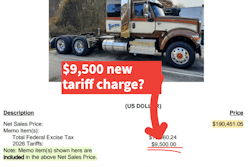As we went to press, the national average retail price of a gallon of diesel shot up 11 cents in one week, to $2.76, or 50 cents more than a year ago. That’s after a year when diesel increased 33 percent to $2.40 per gallon, up from an average $1.81 in 2004.
With prices this high for this long, no wonder the perception remains that fuel costs are killing owner-operators. That was certainly the belief of the CNN Radio correspondent who called Overdrive to talk about fuel prices. The conversation went something like this:
CNN: “So the price of diesel must really be hurting truckers.”
Overdrive: “Well, actually, truckers who know how to manage their fuel costs are doing better today than ever.”
CNN: “Aren’t truckers going out of business because of fuel?”
Overdrive: “When fuel prices first started climbing, many truckers parked their rigs. But our research shows that owner-operators actually made more money in 2005 than 2004, when fuel was considerably cheaper.”
CNN: “But what if the price of fuel keeps climbing?”
Overdrive: “As long as the economy remains strong and there’s more freight than capacity to haul it, truckers who get a fuel surcharge should be able to continue to recoup the cost of fuel.”

And so it went. When discussing the impact of fuel prices on owner-operators, perception is definitely not reality. The number of owner-operator trucking businesses in 2005 actually increased to 174,000, up from 169,400 in 2004, according to the 2006 Overdrive Owner-Operator Behavior Report. A modest bump, sure, but an increase nonetheless.
Income climbed, too. From 2003 to 2004 (truckers hadn’t done their 2005 tax returns when we did the study), average owner-opera-tor income jumped nearly 22 percent, to $57,510. That follows a nearly $5,000 average increase in 2003 over 2002. And 2005 income looks to be even higher.
With oil prices hitting a record $71 a barrel, the cost to fill your tanks isn’t coming down any time soon. But as long as the economy remains robust, that shouldn’t affect your business. Shippers have no choice but to pay higher rates and hefty surcharges to move their freight. Carriers need your capacity, so they must pass those increases on to you.
So between the price of fuel and your value to the market, that diesel running through your veins makes you worth your weight in gold.







